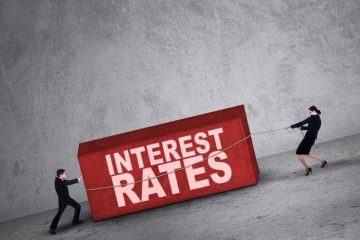Why Investing New Capital During All-Time Market Highs Doesn’t Scare Me
Over the last five years, the S&P 500 index is up 107.37%.
And over this same time period, the Dow Jones Industrial Average is up93.13%.
Meteoric. We’re basically looking at the most robust stock market in the world doubling in five years’ time frame. Are the sum of these companies worth double what they were five years ago? Were these companies worth half back in 2009?
Impossible to say, but I know that valuations of the broader market are getting a bit stretched here. As I previously mentioned, the Shiller P/E ratio stands above 26 right now – well above the long-term average of 16.5. Make what you want of that, but I believe that spells pricey stocks in general. If you don’t like Shiller’s cyclically adjusted 10-year P/E ratio, you can also use the S&P 500′s own TTM P/E ratio. This metric is at19, which is significantly higher than the average of 15 going back more than 100 years.
I Invest In Individual Businesses, Not The Entire Stock Market
Does this mean the stock market is going to correct or crash? Who knows. Luckily, I don’t need to know or care.
I invest in individual companies one company at a time. As such, I value a specific companyon a quantitative fundamental and a subjective qualitative basis. I then come to a reasonable valuation range on a business and invest when the following occur:
1. The business passes my analysis, and appears to be viable, sound, and growing.
2. The business’s valuation makes sense, indicating fair value or undervaluation within range of my reasonable estimate.
3. I have fresh capital available.
4. I have room in my portfolio for this business, meaning the weighting will make sense after a new investment.
Notice that I don’t worry about where the stock market is at. The market could jump 20% from here and my system of analyzing businesses and investing in said businesses won’t change a bit. If such a market move were to occur I might have a hard time finding any single business worthy of fresh capital because they’re all individually expensive at that point – a rising tide lifts all boats – but the broader stock market still has no direct effect on my decision to invest fresh capital.
Why I’m Not Worried About Investing Fresh Capital Right Now
However, I can see why individual investors are scared to invest fresh capital when the market appears broadly overvalued and ripe for a correction. Who wants to invest thousands of hard-earned dollars only to watch your new investment tumble in value? Not me. And I’m guessing not you.
But I’ll tell you right now why investing new capital right now (even with a historically expensive market) doesn’t scare me one bit.
Right now I have a portfolio valued at over $ 160,000, using current market values of all the individual equity stakes. And while some of these businesses, and my stake in them, may be admittedly overvalued, this is the current value of the portfolio.
So that means I have over $ 160,000 of my wealth at stake in the stock market.
As pertinent background information, I typically invest anywhere from $ 1,000 to $ 2,000 at a time in the stock market. I invest this kind of capital almost every single month (missing only two months in the last four years), with most of my individual purchases settling in the $ 1,400 range. That means every time I invest in a business I’m putting over $ 1,000 of my capital at risk in the market.
Now, compare this to the six figures I already have at risk.
If the market corrects 10% the day after I invest $ 1,400 of fresh capital I could slam my head into a wall and get all upset. But maybe that’ll loosen some common sense inside of me. Because I’d then see a 10% unrealized loss on $ 1,400 is only $ 140, while a 10% unrealized loss on $ 160,000 is $ 16,000 – assuming my equity investments fall by the same amount in aggregate as the general market.
If I were to be scared to invest $ 1,400 of hard-earned capital right now, then I should certainly be very afraid of having six figures exposed to the market.
I try to keep perspective here. Imagine being Warren Buffett (Trades, Portfolio) when a major correction hits. Berkshire Hathaway Inc. (BRK.B) has an investment portfolio worth over $ 100 billion right now. A 10% correction means a throat-lump-inducing unrealized capital loss of over $ 10 billion. $ 10 billion, folks. Certainly I’m not going to worry about $ 16,000.
And keep in mind these are all unrealized losses. If the market corrects tomorrow and my portfolio value declines by a significant amount, that simply means that my fresh capital can go that much further, buying more shares for the same amount of money. And more shares means more dividend income. And more dividend income means my reinvested dividends buy more shares. The snowball rolls faster, and I’m that much closer to financial independence.
Meanwhile, the unrealized losses mean nothing unless I sell. My net worth will be worth less on paper, but who cares? I don’t buy stuff down at the local Net Worth Store. I buy stuff with cash, which is supplied via dividend income. The greater the dividend income, the more stuff I can eventually buy. And by stuff, I mean time.
The Long Game
Furthermore, one must consider their time horizon.
If my investment horizon was a year or less then market gyrations would probably concern me. But I don’t invest for the next year. As a 32 year-old, strapping young man, I’m investing for the next four or five decades of my life. What do 10% or 20% corrections matter when I’m thinking about the percentage gains in terms of hundreds over the long haul? Does it matter all that much if The Coca-Cola Company (KO) goes from $ 41 to $ 39 over the next month? Or $ 41 to $ 43 for that matter? Not really, because I’m thinking about KO 40 years from now when it’s priced at $ 1,000 per share.
I sometimes go and take a look at the S&P 500 chart over the last 100 years and what I find is that you don’t see 10% corrections. You can barely even detect major market moves like the 1987 crash. Over the long haul these things really don’t matter. What does matter, however, is your ability to stick to a plan and be consistent. Worrying about timing the market is a sucker’s game, because you’ll be spending your time worrying about something you can’t control. I spend time worrying about things I can control, like saving capital to invest, honing my valuation skills, reading annual reports, and reinvesting my dividend income.
See, the broader market’s ups and downs have nothing to do with how many bottles of Dasani water Coca-Cola might sell over the next decade or how many Big MacsMcDonald’s Corporation (MCD) sells over the next 20 years. The former has pretty much nothing to do with my passive income and the growth of it, while the latter examples have a lot of correlation. You only have so much time in a day. Using this valuable resource worrying about timing the market will only serve to impede your progress.
Conclusion
I’m currently building some fresh capital for my next purchase over the coming weeks. And I’m not worried at all about where the broader stock market is valued at. Sure, the valuation on the entire market doesn’t look good. But I’ve always said the stock market is just like any other market or store, and there is cheaper and more expensive merchandise alike within that store. Staying cautious is of course very important, but I’d advise focusing your time on individual businesses that have attractive valuations relative to underlying operations, their own historical valuation, and the market at large.
I can’t control the market. I can’t control what’s going to happen tomorrow. But if a correction of 10% or more occurs I’ll be comforted knowing that the fresh capital I’m investing is impacted much less than the portfolio I’ve already spent more than four years building, Furthermore, I’ll also keep perspective on my time frame, as I won’t remember this 10% correction two or three decades from now when stock prices are significantly higher due to growth in businesses across all sectors and countries. And I’ll also be very happy to know that cheaper stock prices brings me much closer to my ultimate goal of financial independence whereby my passive dividend income exceeds my expenses.
Full Disclosure: Long KO and MCD.
How about you? Does investing right now scare you?


